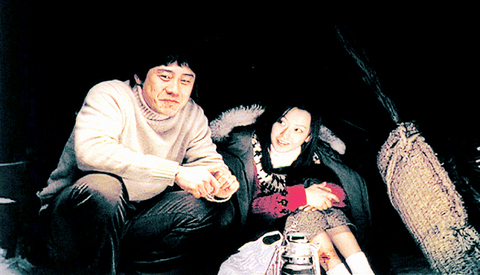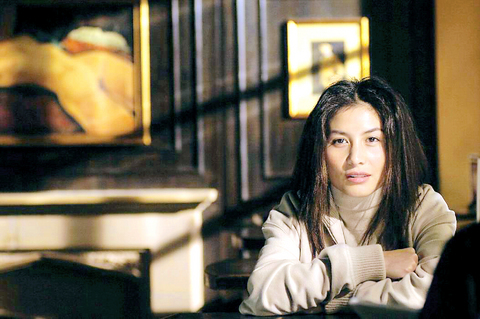The first week of the new year seems a quiet one for the Asian film industry, though the fever of Kung Fu Hustle (
Now confronting Kung Fu Hustle are Butterfly (

PHOTO COURTESY OF HWA JAAN FILMS
Butterfly is Hong Kong independent new blood Yan Yan Mak's (

PHOTO COURTESY OF DEEPJOY INVESTMENT LTD
The film this year has toured Venice and Busan, and it received two Golden Horse nominations: Best Supporting Actress (Josie Ho,
The story follows a young married woman coming to terms with her lesbian sexuality. Roughly adapted from Taiwanese writer Chen Hsueh's (
Butterfly is a middle school teacher who has a wealthy and stable life -- a baby daughter and a loving husband. She encounters a 20-something girl, Yeh, a charming drifter with a child-like smile. Butterfly is deeply drawn to the girl and cannot calm her emotions. The narrative then cuts back to Butterfly's youth and to her high school lover Zhen. With Zhen, she spent a wild time hanging in Zhen's huge apartment, smoking, listening to Nirvana's "Smells Like Teen Spirit," playing with her 8mm film camera and making love all day when the parents were away.
It was a young passion accompanied by political passion -- the two girls are involved in students' movements and Hong Kong's support of the Tiananmen Square democratic movement of the 1980s. But the passion died quickly after the girls were caught in bed by Butterfly's mom. Butterfly left Zhen and soon had a boyfriend. Zhen devoted herself to Buddhism and became a nun.
Twenty years later, Butterfly's passion for women is evoked again while being seduced by Yeh. A struggle to find her true desire again troubles her heart. This time her husband, her daughter and her job are all dragged into the spiral of desire.
Of course, the intimate scenes of both female couples (past and present) are
crucial parts of the movie. Director Mak's use of lens is direct, raw and powerful, making audiences -- even those who cannot accept lesbian love -- look straight at the passion. Those can be the most successful parts of the film. The drawbacks of the film, however, are the slow and tedious final 20 minutes of the film, including a weak ending.
Korean romance film A Letter From Mars, comparatively, is more of a "normal" film, perhaps a too normal romance drama that is typical and predictable. It is a story about a man's persistent love for his childhood girlfriend.
Set in a humble mountain village in South Korea, young girl So-hee has a dream to go to Mars because she believes her father did not die, but is traveling on that planet. She tries to send letters to the father in Mars but of course, the letters are all returned. In order to not see the girl disappointed, So-hee's neighbor Seong-jae decides to write fake letters and deliver them to her. A love between the two begins to grow.
After growing up, Seong-jae becomes a mail man, continuing the job of delivering joy to mail recipients. But So-hee has become a businesswoman in Seoul.
The two are separated and the secret of going to Mars seems to be long buried in the snowy mountain, until one day.
Starring Kim Hee-seon, Korean top actress and model, the film may have some attraction to local fans of Korean TV drama. But as far as the movie goes, it is little more than a nicely packaged cliche; after half of the movie, the audience can already guess the melancholy ending of the story.

June 23 to June 29 After capturing the walled city of Hsinchu on June 22, 1895, the Japanese hoped to quickly push south and seize control of Taiwan’s entire west coast — but their advance was stalled for more than a month. Not only did local Hakka fighters continue to cause them headaches, resistance forces even attempted to retake the city three times. “We had planned to occupy Anping (Tainan) and Takao (Kaohsiung) as soon as possible, but ever since we took Hsinchu, nearby bandits proclaiming to be ‘righteous people’ (義民) have been destroying train tracks and electrical cables, and gathering in villages

Dr. Y. Tony Yang, Associate Dean of Health Policy and Population Science at George Washington University, argued last week in a piece for the Taipei Times about former president Ma Ying-jeou (馬英九) leading a student delegation to the People’s Republic of China (PRC) that, “The real question is not whether Ma’s visit helps or hurts Taiwan — it is why Taiwan lacks a sophisticated, multi-track approach to one of the most complex geopolitical relationships in the world” (“Ma’s Visit, DPP’s Blind Spot,” June 18, page 8). Yang contends that the Democratic Progressive Party (DPP) has a blind spot: “By treating any

Swooping low over the banks of a Nile River tributary, an aid flight run by retired American military officers released a stream of food-stuffed sacks over a town emptied by fighting in South Sudan, a country wracked by conflict. Last week’s air drop was the latest in a controversial development — private contracting firms led by former US intelligence officers and military veterans delivering aid to some of the world’s deadliest conflict zones, in operations organized with governments that are combatants in the conflicts. The moves are roiling the global aid community, which warns of a more militarized, politicized and profit-seeking trend

This year will go down in the history books. Taiwan faces enormous turmoil and uncertainty in the coming months. Which political parties are in a good position to handle big changes? All of the main parties are beset with challenges. Taking stock, this column examined the Taiwan People’s Party (TPP) (“Huang Kuo-chang’s choking the life out of the TPP,” May 28, page 12), the Democratic Progressive Party (DPP) (“Challenges amid choppy waters for the DPP,” June 14, page 12) and the Chinese Nationalist Party (KMT) (“KMT struggles to seize opportunities as ‘interesting times’ loom,” June 20, page 11). Times like these can